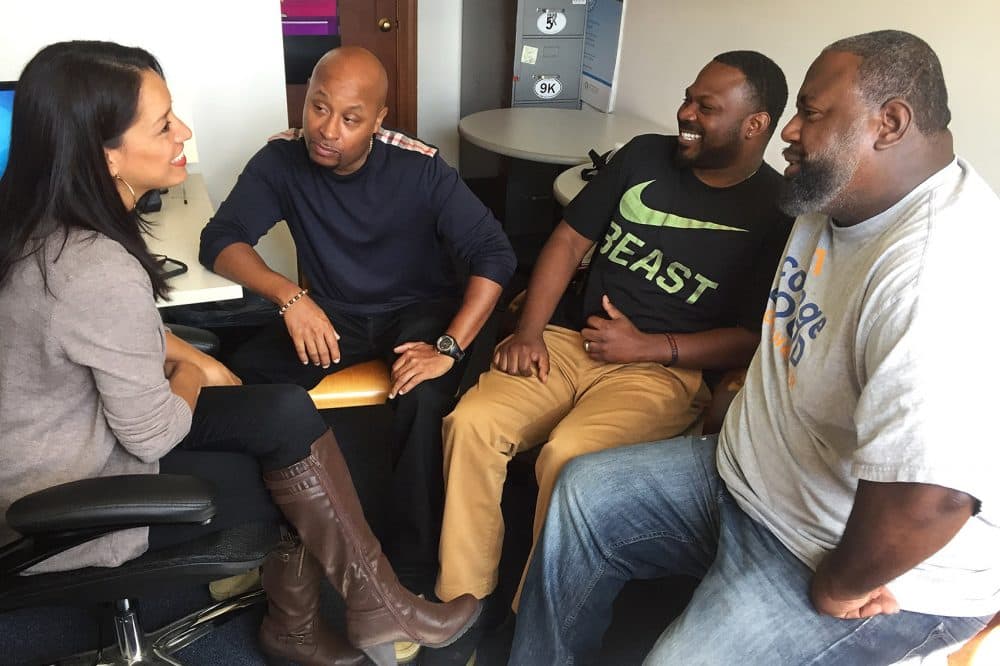Advertisement
Counseling The Counselors: Workers Helping Troubled Youths In Boston Learn To Cope With Job's Trauma
Resume
Counselors at College Bound Dorchester, a violence prevention organization in Boston, are working on an ambitious goal: to eliminate gang violence in the city.
Their approach is to convince gang members to quit the streets and go to college. It's a stressful job for the program's counselors. So stressful, in fact, that many of the counselors themselves are now getting counseling.
In Advocacy, There's Still Trauma
In a garret in the old schoolhouse that serves as the program's headquarters, three men who all grew up with gang ties discussed the work they do today counseling youths on troubled trajectories that feel familiar.
The men talked about the trauma working with former gang members inflicts, from difficulty sleeping and not taking care of themselves, to constantly worrying about the current and former gang members they look after. They said that sometimes, they can even feel triggered in court while trying to help others, suddenly finding they are reliving their own days in front of a judge.
"Just because you choose to put the weapon down does not mean all your problems disappear."
I.V. Johnson
I.V. Johnson, one of the counselors, explained that one issue is that though the former gang members they counsel want to leave their old life, it will not necessarily let them go.
"Just because you choose to put the weapon down does not mean all your problems disappear," Johnson said. "All those people that you've hurt or the carnage that you've created in the streets, that's not over. That is still there.
"I mean, I can even go out and try to mediate some of that stuff for you, but it does not mean that you are safe."
This is not a 9-to-5 job. It stays with you, Johnson explained.
"It's hard for me to go to sleep at night knowing that one of my students is homeless now, and they're on the street," he said.
And some of the youths they help face challenges beyond homelessness.
"I had a young man who had gotten shot first year of college, did not want to take the public transportation to get there, and he was afraid to get to school," Johnson said.
The job brings pain and joy, said Warren Williams, one of the other counselors.
"The joy of your students coming around, taking key to your words and changing their life," he said. "And then there's the pain of some students, they don't get it as quickly, they're still out in the streets, dibbling and dabbling, and unforeseen things happen to them."
Johnson said such "unforeseen" tragedies, like their mentees getting shot or arrested, create a serious sense of loss for the College Bound Dorchester advisers.
"And some of the disappointment, because we got a lot of people who we invested a lot of time and effort in that still might have committed a crime where they are going to be incarcerated forever," Johnson said. "Or, a few students who passed, because, again, they were a testament to how they lived, and this is what the end of the road looks like."
Although these losses have been hard on the counselors, they also can be resistant to getting help, explained Will Dunn, another mentor with the program.
"Black men and going to therapy is taboo," Dunn said. "It just don't mix."
So, when College Bound Dorchester had to find the right counseling services for its workers, it turned to Old Trinity Church. The church had experience providing such services to youth of color in the judicial system and in schools. Trinity hired Blanca Valentin to counsel the counselors.
"Part of my message to them was about the importance of creating healthy boundaries and understanding what that means for them," Valentin said. "Burnout in this type of work is very high. It is difficult work. It is emotional work."
Valentin meets teams of advisers weekly, and she also holds regular one-on-one sessions. She bumps into them on a daily basis. She gives consultations to about 20 members of College Bound Dorchester's staff.
"She really gets us to focus on ourselves," Williams said, "because you can't help no one else if you can't help yourself. So she gets us to really focus on self-care and taking care of yourself, eating right, sleeping — just so you can do your job a little bit better."
It's an important job, but Rebecca Jackson, with the Trinity Boston Foundation, said the counselors can forget that.
"The College Readiness Advisers are people who, systemically, are kind of at the bottom of the barrel, and so, there's a level to which they need that deep connection and to know that Blanca ... really cares about them, really sees them, really, sort of, what I like to say, sees their beauty," Jackson says.
That connection helps them continue to do their work to prevent gang violence.
This segment aired on November 29, 2017.
